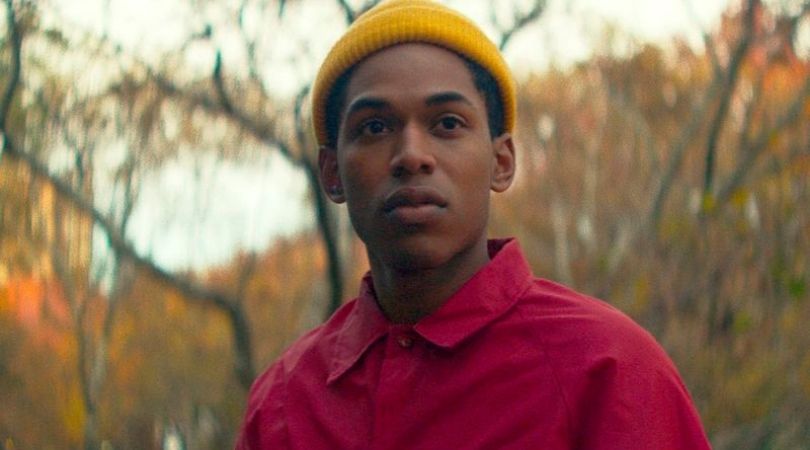
“Boy. Man. Human. Monster. That feels great.” says 17-year-old Steven Harmon (Kelvin Harrison Jr.) before asking the audience what they see when they look at him, in voice-over as he tries to come to terms with the psychological and emotional toll of being a Black male in America. Directed by Anthony Mandler, Monster 2021 could be seen as yet another film about how the American judicial system exploits and victimizes young Black men, and it is, but that doesn’t make the story being told any less necessary or impactful.
An honors student, storyteller, and curious by nature, Steve is your typical teenager searching for a way to show the world how sees it through the lens of a camera. In his day-to-day life he’s fascinated by the everyday goings-on of the people in the noisy and colorful Bronx neighborhood he lives in with his family – father Mr. Harmon (Jeffrey Wright), Mrs. Harmon (Jennifer Hudson), and younger brother Jerry (Nyleek Moore), and friends. Never in his life did he ever think the possibility of him being arrested and jailed would be a reality, yet that’s exactly what happens one night as he’s been named as a suspect in the murder of Mr. Nesbitt, the neighborhood bodega owner. Written for the screen by Radha Blank, Colen C. Wiley, and Janece Shaffer and based on the novel of the same name by Walter Dean Myers, the film brings the thoughts of Steve to the forefront as we’re shown how he saw life and himself before and after his arrest.
In the before, Steve’s life is all color. Everything he wears is bright and eye-catching, from the cute yellow beanie he wears on his head to the colorful sweaters, jackets, and sneakers. They all represent his bright future as a filmmaker and his overall outlook on life. Before, he’s outgoing at school and in his interactions with the people he encounters, until one such encounter leads to a series of events that forever change how he sees the world around him and the way he believes others see him, too.
Observing Steve filming a skateboarder from the basketball court, James King (Rakim Mayers), known as King for short, is curious about why Steve is filming and watching people and asks Steve to take his picture because he’s the most interesting person around. Wearing his own brightly colored sweater, King is charismatic and charming in his brashness, and the two begin a friendship that mostly operates through the camera lens.
Before his world loses its color and vitality, before his nights filled with laughter and kisses from his girlfriend are replaced with the screams of imprisoned men and his own torment, enclosed in a jail cell, Steve knew who he was and where he was headed. But after he’s branded a killer, a hopeless case, as a monster, he learns the sad truth of how America sees him. As how white America sees him. In the before and after is where Monster makes clear how fragile the position of young Black men, the family’s hope and dreams for the future are under the weight of a country whose judicial system sees them as criminals, as creatures to be locked away while being exploited and shown no path forward.
In the after, Steve’s world is nightmares, steel bars, and a courtroom devoid of color. Here Steve tries to figure out how he could be a monster if he and others like him cry in the dark. When he begins to question if he’s alive he’s reminded when his body “shakes and shivers” from the reality of his situation manifests itself. He’s 17. He’s a child in prison with grown men who themselves are unable to handle the mental strain of the world around them.
Implicated as an accomplice in the murder of someone he knew, Steve’s life is now one where he’s surrounded by guards who abuse inmates, and inmates who scream back in defense. In order to cope he pretends that in the daytime the chilling and colorless environment of the courtroom takes place in a movie where he’s the director, writer, and star because it allows him to believe if only for a short while that he has some semblance of control. He knows that his future relies on how strangers who see him as nothing but a criminal, while having no knowledge of who he is outside of the story the prosecutor creates, and the stereotypes perpetuated by the media.
No one seems to care how at night he’s unable to sleep, fighting internally and externally against the demons seeking to consume him, just that he looks presentable and composed in a nice suit while sitting, waiting to be judged. Because not only does he have to prove he’s not guilty of this terrible crime, but that he’s worthy of even being seen as a person. As his defense attorney Maureen (Jennifer Ehle) says, he has to make them see him as a human being, which in and of itself serves as a damning indictment of the way Black people are stripped of their humanity by a judicial system that says justice is blind, even though it really isn’t. Certainly not where race is concerned.
“There’s no space for grays in the court of law.” In the room where his fate will be determined, the color Steve was surrounded by is stripped away. Even his parents’ clothing reflects how this isolating and traumatizing event has changed them. Mr. Harmon finds himself at emotional loose ends, unable to comprehend what’s happening, as with every scenario he imagined when Steve was born, speaking to his son over a plexiglass divider, unable to touch him, was never one of them. For what parent would ever dream of their child being in a situation like this. Mr. Harmon himself being an artist saw only the chance to share his knowledge and love with his two sons, but now he’s reminded that life is never fair, predictable, or goes exactly the way we would like it to. And Steve realizes he’s never seen his father looking the way he does with deepened frown lines and trembling hands.
For Mrs. Harmon, her faith serves as her hope, and the way for her to stay connected to her son, as she worries about her youngest. She prays with Steve, as other Black men look on, hoping that telling him of men she’s heard of that “have made it” back from this world, would inspire him, not having any idea of the constant stress and fear he feels as images of his nightmares flash through his mind. In the after there is a disconnect between mother and son. In the after, their family isn’t what it once was.
Harrison Jr. gives a powerful performance as a young man who finds his worldview shattered by betrayal, insecurity, anger, fear, doubt, and guilt. Watching him go through all of these heavy emotions during the trial, there was a moment I gasped at the realization that all of the main Black male actors have previously played characters who were also imprisoned. Jeffrey Wright in All Day and a Night (2020), Jharrell Jerome who in When They See Us (2019) played Korey Wise, a Black man that was wrongfully accused and convicted of a heinous crime as a teenager – a similar situation to Steve -, and for John David Washington who plays Richard ‘Bobo’ Evans, a gang member and one the people involved in the murder and who implicates Steve in it, and Mayers, Monster 2021 they too have such a casting in their resume. What this says about Hollywood and the roles being offered – versus those not being offered to Black men, is another topic for another article.
Monster 2021 isn’t just about the monstrous visage society, and circumstances paint young Black boys, men, and by extension their families as it’s about how monstrous the judicial system and the working of it are. The film shows the myriad of ways one event, the trauma created in hundreds of thousands of Black (and non-Black) people experience on a daily basis from the act of being arrested, to booking where they’re confronted with the racist assumptions and stereotypes of police officers prosecutors, judges, juries and even their own defense attorneys. Even if they’re found not guilty, their perception of who they are as a person is forever changed, and another strike has been made against them. This time not just by society, but themselves.
Monster 2021 is currently streaming on Netflix.
Monster
-
Rating - 7.5/107.5/10
TL;DR
Monster isn’t just about the monstrous visage society, and circumstances paint young Black boys, men, and by extension their families as it’s about how monstrous the judicial system and the working of it are.




